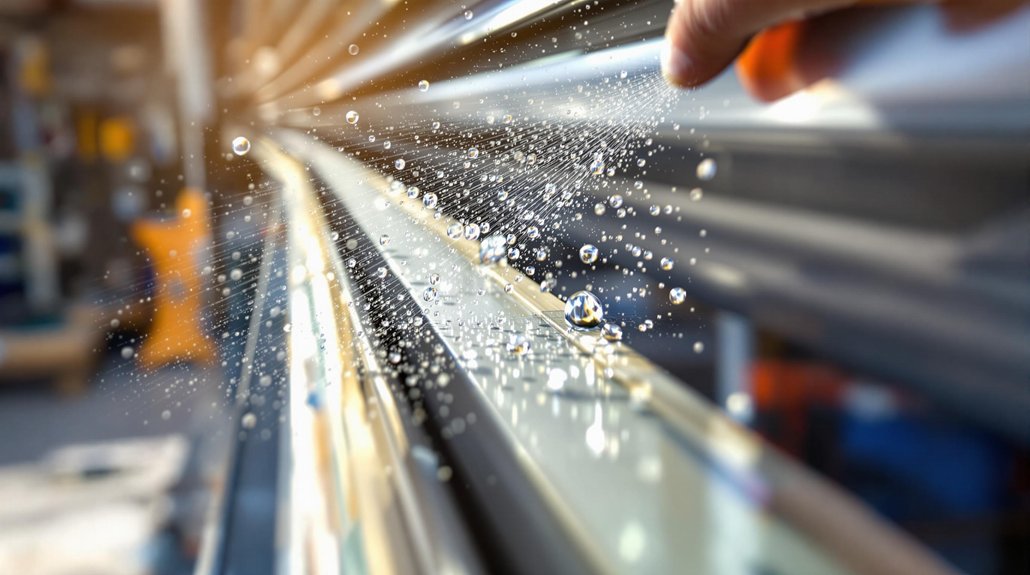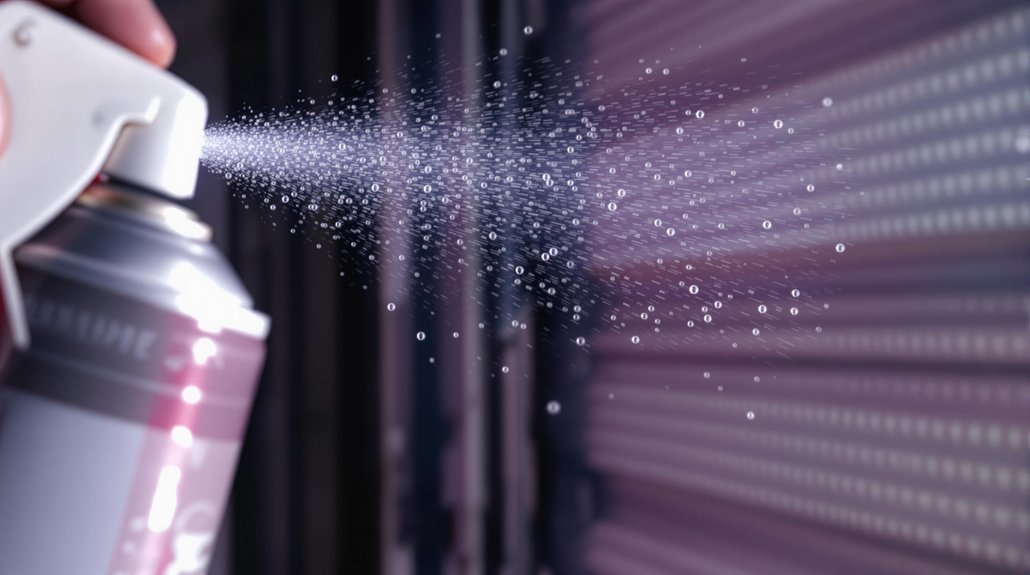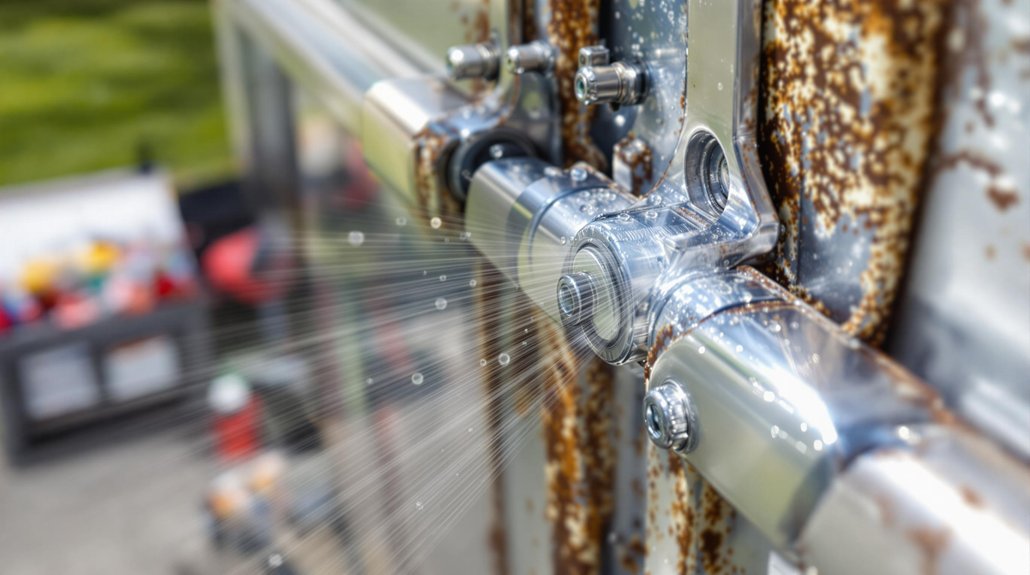The best lubricants for a garage door are silicone spray and lithium grease. Silicone spray provides a thin coating that prevents rust and reduces friction effectively. It is easy to apply and ideal for regular maintenance. In contrast, lithium grease is thicker, making it perfect for heavy-duty applications and providing long-lasting protection against wear. Both options guarantee smooth operation and extend the lifespan of the garage door. Regular lubrication every six months is recommended for peak performance. Exploring the application techniques and maintenance tips can enhance your garage door's functionality even further.
Key Article Highlights
- Silicone spray is ideal for a thin, rust-resistant coating that reduces friction on garage door components.
- Lithium grease offers moisture resistance and is perfect for heavy-duty applications, especially on high-friction areas.
- Motor oil can be used but may attract dirt and debris; it's best for frequently moving parts.
- Use a spray nozzle for silicone application and a brush for grease to ensure even coverage.
- Regular lubrication every six months enhances performance and extends the lifespan of the garage door.
Importance of Lubrication
Lubrication is a key aspect of garage door maintenance. It guarantees smooth operation and extends the life of the door and its components. The importance of lubrication cannot be overstated. A well-lubricated garage door operates quietly and efficiently, reducing wear on moving parts. This leads to fewer repairs and lower maintenance costs over time.
Garage doors consist of various moving parts, such as hinges, rollers, and tracks. Without proper lubrication, these parts can become stiff and may even jam. This can result in the door not opening or closing properly, which can be frustrating and inconvenient. Regular lubrication minimizes friction, allowing the door to move freely and safely.
In addition to improving functionality, lubrication also enhances safety. A properly functioning garage door decreases the risk of accidents caused by sudden malfunctions. Routine maintenance, including lubrication, is essential to guarantee that your garage door remains reliable.
Types of Lubricants
Selecting the right lubricant is vital for maintaining a garage door's performance. There are several lubricant types suitable for this task. The most common include silicone spray, lithium grease, and motor oil. Each type has unique properties that cater to different needs.
Silicone spray is a popular choice. It provides a thin coating that prevents rust and reduces friction. Lithium grease, on the other hand, is thicker and ideal for heavy-duty applications. It stays in place and is resistant to moisture. Motor oil is another option, though it may attract dirt and debris over time.
Application methods vary depending on the lubricant type. For silicone spray, a simple spray nozzle allows for even distribution on tracks and hinges. Lithium grease can be applied using a brush or small applicator for precise placement. Motor oil typically requires a rag or cloth to wipe onto the moving parts.
Choosing the right lubricant type and application method is essential. This guarantees the garage door operates smoothly and lasts longer. Regular maintenance with the appropriate lubricant will lead to a quieter and more efficient garage door system.
Silicone Spray Benefits

Silicone spray offers several advantages for garage door maintenance. It provides long-lasting protection against wear and tear while ensuring that surfaces remain clean due to its non-staining formula. These benefits make silicone spray an excellent choice for keeping garage doors functioning smoothly.
Long-lasting Protection
A reliable solution for maintaining garage doors is the use of silicone spray. This product provides long-lasting protection and helps keep the door functioning smoothly. One of the main advantages of silicone spray is its long-lasting durability. Once applied, it forms a protective layer that reduces friction and wear on moving parts. This helps to prevent rust and corrosion, ensuring that the door remains in good working order for a long time.
Additionally, the protection longevity offered by silicone spray is impressive. It can withstand varying weather conditions, making it suitable for both indoor and outdoor garage doors. The spray does not break down easily, which means you won't have to reapply it frequently. This is particularly beneficial for busy homeowners who prefer a low-maintenance solution.
Non-staining Formula
One significant benefit of using silicone spray is its non-staining formula. This feature makes it an excellent choice for lubricating garage doors. Unlike some other lubricants, silicone spray does not leave behind unsightly marks or stains on surfaces. This is particularly important for homeowners who want to maintain a clean and professional appearance.
The non-staining advantages of silicone spray are clear. When applied, it dries quickly and does not attract dust and dirt, resulting in a cleaner environment. This residue-free option guarantees that the garage door functions smoothly without the mess associated with traditional lubricants.
Additionally, the non-staining nature of silicone spray allows it to be used on various materials, including metal, plastic, and rubber, without fear of damaging the finish. This versatility makes it a preferred choice for many homeowners.
Grease vs. Oil
When lubricating a garage door, it is important to understand the differences between grease and oil. Grease is thicker and stays in place better, while oil can penetrate tight spaces more easily. Choosing the right lubricant depends on the specific needs of your garage door components.
Grease Benefits and Uses
Proper lubrication is essential for maintaining the functionality of a garage door, and choosing the right lubricant can make a significant difference. Grease is a popular choice for garage door maintenance due to its thicker consistency. One of the main benefits of grease is its ability to stay in place longer than oil. This property makes grease a superior option for areas that experience high friction, such as rollers and hinges.
The composition of grease usually includes a base oil and a thickening agent. This combination allows grease to adhere well to surfaces, providing a long-lasting protective layer. When performing a grease application, it is important to focus on the moving parts of the garage door system. Applying grease to these areas reduces wear and tear, ensuring smoother operation over time.
Additionally, using grease can prevent rust and corrosion by acting as a barrier against moisture. This is particularly beneficial for garage doors exposed to the elements. Overall, grease is an effective lubricant that enhances the performance and lifespan of garage doors when applied correctly. Regular lubrication with grease can lead to fewer repairs and greater reliability in your garage door system.
Oil Advantages and Applications
Oil serves as a versatile lubricant for garage doors, offering distinct advantages over grease in certain applications. One key benefit of oil is its ability to penetrate tight spaces. This makes it ideal for lubricating moving parts like rollers, hinges, and tracks. Oil types vary, including silicone oil, mineral oil, and synthetic oil. Each type has unique properties that can enhance performance based on specific needs.
Oil applications are best suited for parts that require frequent movement and less friction. For instance, using oil on rollers helps them glide smoothly, reducing wear and tear. Unlike grease, which can attract dirt and debris, oil typically remains cleaner and is less likely to cause buildup. This quality makes oil a practical choice for maintaining the long-term health of garage door components.
Moreover, oil can withstand a wider range of temperatures, making it effective in both hot and cold environments. This adaptability is essential for garage doors, which operate under varying conditions. Overall, choosing oil for specific parts can lead to better performance and a longer lifespan for your garage door system.
Choosing the Right Lubricant
Selecting the appropriate lubricant for garage doors involves understanding the differences between grease and oil. Each lubricant has its own advantages and ideal applications.
- Grease offers long-lasting protection.
- Oil penetrates tight spaces effectively.
- Grease is ideal for bearings and rollers.
- Oil is better for hinges and tracks.
- Application frequency varies based on the type used.
When making a lubricant selection, consider the material and components of your garage door. Grease tends to hold up better in places with high friction, while oil is better for lighter applications. If you need a product that lasts longer with less frequent reapplication, grease is the way to go. However, oil is often easier to apply and can be used more frequently without creating a mess.
Ultimately, the decision should also factor in your maintenance routine. If you prefer to lubricate often, oil may suit you better. For those who desire less frequent upkeep, grease is a strong contender. Understanding these elements will help you make an informed choice for maintaining your garage door effectively.
Application Techniques

Effective application techniques are essential for guaranteeing the smooth operation of a garage door. To begin, make certain the garage door is clean and free from debris. This prepares the surface for better lubrication. Next, use a spray technique to apply the lubricant. Hold the can about six inches away from the parts you are treating. This distance allows for an even distribution of the lubricant without over-saturating any area.
Focus on key components such as rollers, hinges, and the track. Apply a light coat, making sure that all moving parts receive adequate coverage. Avoid applying too much lubricant, as this can attract dust and dirt, making the door harder to operate.
Application frequency is another important factor. It is generally recommended to lubricate the garage door every six months. However, in areas with extreme weather or heavy use, more frequent application may be necessary. Regularly check the door's operation to determine if lubrication is needed sooner. By following these techniques, you can maintain the efficiency and longevity of your garage door, making certain it operates smoothly for years to come.
Maintenance Tips
Regular maintenance is essential for guaranteeing the long-term performance of a garage door. Routine checks can help identify issues before they become significant problems. Establishing a maintenance schedule will keep your door operating smoothly and efficiently. Here are some important maintenance tips to take into account:
- Inspect the tracks for dirt and debris.
- Verify that all bolts and screws are tightened.
- Lubricate hinges, rollers, and springs regularly.
- Test the auto-reverse feature for safety.
- Check the weather stripping for wear or damage.
Perform these checks at least once every few months. This proactive approach can prevent costly repairs and extend the life of your garage door. Additionally, pay attention to any unusual noises during operation. These may indicate that lubrication is needed or that a part is failing. Keeping a detailed record of your maintenance activities can also be beneficial. This record will help you track when specific tasks were completed and when they need to be repeated. By following these maintenance tips, you can guarantee that your garage door remains functional and safe for years to come.
Frequently Asked Questions
Can I Use Household Oils for Garage Door Lubrication?
Imagine a well-oiled machine, gliding effortlessly. While household oil types may seem tempting, they often lack the necessary properties. Opt for specialized lubrication alternatives to guarantee your garage door operates smoothly and reliably.
How Often Should I Lubricate My Garage Door?
Regular garage door maintenance is essential. Lubrication tips suggest applying lubricant every six months. This guarantees smooth operation and prolongs the life of the door, preventing unnecessary wear and tear on its components.
Is It Safe to Lubricate Garage Door Springs?
Lubricating garage door springs is akin to nurturing a delicate balance. Proper spring maintenance guarantees smooth operation, but lubrication safety is vital; use appropriate products and techniques to avoid accidents and prolong the springs' lifespan.
What Happens if I Over-Lubricate My Garage Door?
Over-lubricating a garage door can attract dirt and debris, leading to potential damage and increased maintenance needs. Proper garage door maintenance involves using appropriate lubrication techniques to guarantee smooth operation without excess buildup.
Can I Use WD-40 on My Garage Door?
While WD-40 can work for garage door maintenance, consider safer substitutes. Seeking suitable WD-40 alternatives guarantees effective lubrication without potential damage, promoting smooth operation and longevity. Prioritize proper products for ideal performance and protection.
